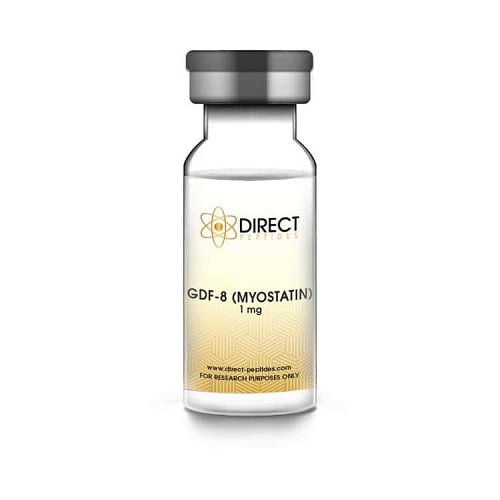
GDF-8, better known as Myostatin, is that switch. It’s the molecular handbrake that tells your muscle cells: “Whoa there—no need to turn into the Hulk today.”
At Direct Peptides, scientists have found that if you inhibit or block this growth regulator, muscle mass can increase dramatically. That’s why Myostatin is a powerful subject in studies on muscle wasting diseases, aging, metabolic disorders, and even heart failure.
What Exactly Is GDF-8 (Myostatin)?
GDF-8 is a member of the TGF-β (Transforming Growth Factor-beta) superfamily a group of proteins deeply involved in regulating cellular growth and development. Myostatin specifically governs skeletal muscle size by suppressing excessive growth. This concept is at the core of GDF-8 Myostatin for Muscle Growth, which has garnered significant interest for its potential in muscle regulation.
Here’s the fascinating bit: the active GDF-8 protein is identical across species—humans, mice, cows, even rats. It’s evolution’s way of saying, “Don’t mess with the formula.”
In its latent form, Myostatin floats under the radar until activated. Once triggered, it signals muscles to slow growth using a precise receptor pathway. Think of it as a master regulator that ensures muscles don’t spiral out of proportion.
How GDF-8 Myostatin Works: The Mechanism in a Nutshell
It all comes down to receptor signaling. Myostatin binds to activin type II receptors (ActRIIB) on the surface of muscle cells. This sets off a cascade of intracellular reactions that ultimately limit muscle cell proliferation and size.
In other words, Myostatin doesn’t destroy muscle—it just keeps it in check.
But block the signal? That’s when things get interesting.
Research Benefits of Blocking GDF-8 Myostatin
Scientists are exploring how manipulating this peptide could lead to breakthroughs in treating diseases and improving human performance. Here's what research has uncovered so far:
Combatting Muscle Wasting
Inhibiting Myostatin boosts muscle mass—making it a prime candidate for treating conditions like muscular dystrophy, sarcopenia, and cachexia.
Enhanced Muscle Regeneration
Post-injury or surgery, Myostatin blockade may enhance tissue repair and muscle fiber regeneration—crucial for recovery in both clinical and athletic settings.
Increased Strength and Performance
Mice genetically modified to lack Myostatin? Think little furry bodybuilders. These animals show dramatically increased muscle size and strength.
Reversing Age-Related Decline
Aging brings muscle loss. Myostatin inhibitors are being studied to slow or reverse this process, helping elderly populations maintain mobility and independence.
Cardiac Health Applications
Research suggests that inhibiting Myostatin may improve cardiac function in heart failure patients by encouraging heart muscle growth and repair.
Metabolic Improvements
Some studies indicate that blocking Myostatin can enhance insulin sensitivity and support healthier metabolic activity—potentially benefiting those with diabetes or metabolic syndrome.
Veterinary and Agricultural Use
Yes, even cows get gains. Myostatin inhibitors are being researched to enhance muscle development in livestock, particularly breeds like Belgian Blue cattle, known for their massive muscle mass.
Go to Homepage
GDF-8 Myostatin Products Available for Research
GDF-8 Myostatin Peptide Vial (1 mg)
-
Purity: 99%
-
Form: Lyophilized powder for reconstitution
-
Ideal For: Advanced studies on muscle growth, metabolism, and therapeutic applications
-
Note: Pair with Bacteriostatic Water and proper reconstitution tools from our [Peptide Supplies section].
GDF-8 Myostatin Nasal Spray
-
Volumes: 15 ml and 30 ml
-
Form: Sterile nasal spray in glass bottles
-
Application: Offers fast absorption and precise dosing
-
Research Use: Convenient option for studies on muscle regeneration, aging, and metabolic health
Why Researchers Choose GDF-8 Myostatin
From preventing muscle atrophy to enhancing tissue healing, GDF-8 continues to hold a strong position in pre-clinical research. Whether you’re studying metabolic performance, age-related decline, or muscle wasting conditions, this peptide delivers a robust platform for innovation.
“Nature gives you muscle. Myostatin takes some back. Science says, ‘Let’s renegotiate.’”
